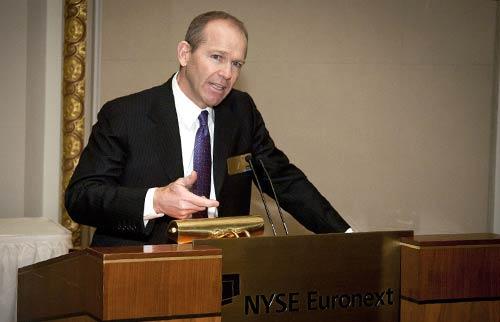The mission of David Calhoun, chief executive officer of The Nielsen Company, one of the world's leading suppliers of marketing and media information, TV ratings, online intelligence and cell phone data, is to measure the world in a "watch and buy" way.

David Calhoun, CEO of The Nielsen Company [China Daily]
The "watch" segment provides audience data and analytics primarily to the media and advertising industries. The "buy" segment provides retail transactional measurement and consumer behavior information as well as analytics primarily to businesses in the consumer goods industry.
"If it can't be measured, it can't be managed," Calhoun told China Daily in his first exclusive interview after the company floated its shares on the New York Stock Exchange in January, raising approximately $2.1 billion in net proceeds. It was the biggest initial public offering since General Motors Co's public rebirth at the end of last year.
Although Calhoun declined to disclose numbers on how much investment Nielsen plans to pour into China, he said China, India and Africa are where the company makes its biggest investments.
"And they will continue to be that way for quite a long time," he added. "For the next two years, the increase in our investment in China will be at least 100 percent."
Nielsen's business in China has more than doubled over the past few years, growing much faster than the industry average reported by the China Market Research Association.
 According to Nielsen's financial report, developing countries accounted for about 17 percent of the company's revenue in 2009. Incorporated in the Netherlands but headquartered in New York, the company now operates in more than 100 countries.
According to Nielsen's financial report, developing countries accounted for about 17 percent of the company's revenue in 2009. Incorporated in the Netherlands but headquartered in New York, the company now operates in more than 100 countries.
In March, the company reported its 2010 financial results, saying revenues for the year increased 6.6 percent to $5.126 billion, or 6.1 percent on a constant currency basis.
For Calhoun, the company's biggest difficulty in China is the scale of the country.
"There are so many people to reach and measure, so finding qualified people to acquire data, finding qualified measurement scientists to process that data and then packaging it in a way that satisfies our clients and manufacturers in China is the biggest challenge," he said.
To deal with the problem, Nielsen attaches great attention to localization. Calhoun's suggestion for any other companies coming into this fast-developing country is to "get local fast".
"I consider our business in China to be very local, and we will become more local," said Calhoun, "This is critical to release the potential of our company in the market."
As proof, the company has just appointed Yan Xuan as president of Nielsen Greater China, with responsibility for all of Nielsen's business activity on the mainland, Hong Kong, Macao and Taiwan. It was the first time Nielsen named a Chinese native as the president of its China operation.
Yan, who was educated in the United States, where he picked up a doctorate in jurisprudence, reports to Calhoun directly and is now a member of the Nielsen executive council.
Calhoun said the appointment reflects Nielsen's commitment to and focus on China.
Yan's experience in leading sales, business development, strategic investment and government affairs, and knowledge of the China market will add to the momentum of Nielsen's efforts to further grow the business and accelerate growth of the company's clients, Calhoun added.
However, Calhoun never weighs people highly just because they are smarter than everybody else. "I actually see it differently. I rate people highly when they create an environment where everybody thinks they are smart and everybody contributes. Success is about more than just being smart. You also need leadership," he said.
1 2 Next




